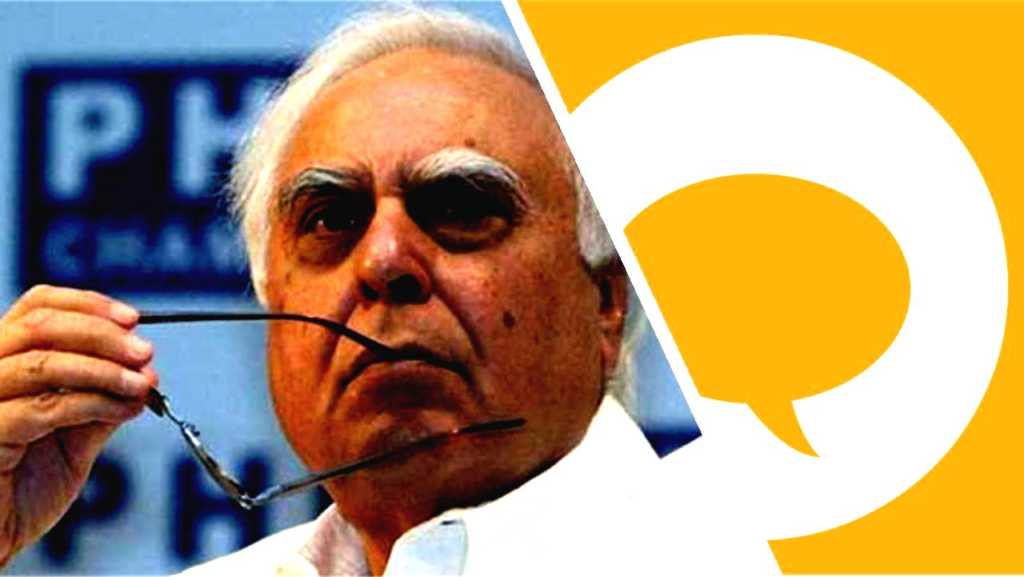In an act that goes completely against the self-proclaimed democratic ethos of the Congress Party, its senior leader Kapil Sibal has threatened to file a defamation suit against OpIndia, a popular website that has routinely exposed the mainstream media and the leftist cabal.
OpIndia recently published a news story after coming across some damning information. The story brought to light the murky land transactions carried out by Kapil Sibal in Delhi, when he was a minister in the UPA government. According to this OpIndia report, Kapil Sibal had allegedly acquired land worth tens of crores in Delhi for merely Rs. 1 lakh from some Piyoosh Goyal, who is reportedly under the CBI scanner for money laundering. The report further states that Kapil Sibal acquired the land by becoming the owner of a company called Grand Castello. It must be remembered that OpIndia had sought Sibal’s views before running the story, a request Sibal ignored. However, once the story was published and picked up by the BJP, Kapil Sibal took a u-turn and admitted that he had bought the company Grand Castello. A few months ago, he had denied being the director or the owner of the company when approached by a South African journalist Craig McKune.
The rough handling of questions raised by a media outlet, and threats to sue the website should not come as a surprise. This is the same Kapil Sibal who was the brain behind the infamous Section 66A of the Information Technology Act, 2000. The impugned section, which was struck down as unconstitutional by the apex court, provided for the imprisonment of the accused on posting ‘annoying or inconvenient’ material on social media. The act did not define the ambiguous terms, and any trivial post on the internet could be taken as ‘annoying or inconvenient’ by the government to crack down on those speaking against it. The controversial provision, which went totally against the spirit of the Constitution of India, especially Article 19 and Article 21 of the Constitution which deal with freedom of speech and liberty of the individual, was responsible for many arrests.
Kapil Sibal earned enormous infamy for piloting Section 66A of the Information Technology Act, 2000. The provision was vague and draconian to such an extent, that even Sibal’s former colleague had to mention that it was poorly drafted and misused. Kapil Sibal, during his tenure as the IT minister was dreaded for his anti-press approach, and the fear in the mainstream media is still visible. One cannot think of a better reason as to why the mainstream media has refrained from covering such a juicy story.
However, once the UPA was thrown out of power, Kapil Sibal changed colors and tried to don the image of a protector of free speech in order to reap political benefits. Recently, Kapil Sibal represented The Wire, a leftist portal, in a petition before the Supreme Court. The petition challenged the Gujarat High Court’s decision in the defamation case filed by Jay Shah, son of BJP president Amit Shah. In the course of this petition, Sibal argued that defamation proceedings and gag orders cannot be used to “throttle journalism”. Ironically, these remarks come from a former minister who once piloted an amendment that empowered the state to jail people who posted ‘annoying or inconvenient’ things on social media.
It seems that for the Congress Party in general and Kapil Sibal in particular, the right to free speech and the freedom of the media essentially depend on the kind of news story that a media outlet has covered. According to him, the freedom of the media is allegedly curbed when a defamation suit is filed by Jay Shah, but OpIndia deserves to be slapped with a suit for causing ‘inconvenience’ to the former IT Minister. Perhaps Sibal threatened to file a defamation suit against OpIndia in an attempt to scare the rest of the media away from covering the details of a murky land transaction allegedly involving him. He might have succeeded to a certain extent, but now that social media has caught wind of the story, it is here to stay. With or without the mainstream media’s support, it will be pursued.
